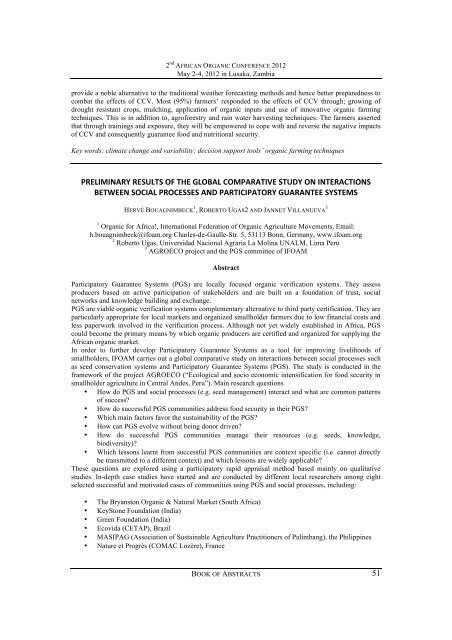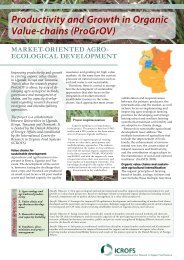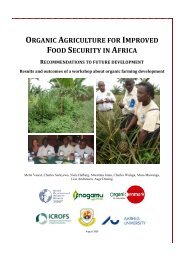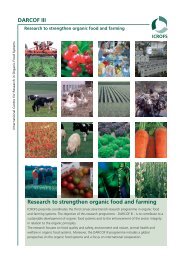The 2nd African Organic Conference â Mainstreaming ... - ICROFS
The 2nd African Organic Conference â Mainstreaming ... - ICROFS
The 2nd African Organic Conference â Mainstreaming ... - ICROFS
Create successful ePaper yourself
Turn your PDF publications into a flip-book with our unique Google optimized e-Paper software.
2 nd AFRICAN ORGANIC CONFERENCE 2012<br />
May 2-4, 2012 in Lusaka, Zambia<br />
provide a noble alternative to the traditional weather forecasting methods and hence better preparedness to<br />
combat the effects of CCV. Most (95%) farmers’ responded to the effects of CCV through; growing of<br />
drought resistant crops, mulching, application of organic inputs and use of innovative organic farming<br />
techniques. This is in addition to, agroforestry and rain water harvesting techniques. <strong>The</strong> farmers asserted<br />
that through trainings and exposure, they will be empowered to cope with and reverse the negative impacts<br />
of CCV and consequently guarantee food and nutritional security.<br />
Key words: climate change and variability; decision support tools’ organic farming techniques<br />
PRELIMINARY&RESULTS&OF&THE&GLOBAL&COMPARATIVE&STUDY&ON&INTERACTIONS&<br />
BETWEEN&SOCIAL&PROCESSES&AND&PARTICIPATORY&GUARANTEE&SYSTEMS&&<br />
HERVÉ BOUAGNIMBECK 1 , ROBERTO UGAS2 AND JANNET VILLANUEVA 3<br />
1 <strong>Organic</strong> for Africa!, International Federation of <strong>Organic</strong> Agriculture Movements, Email:<br />
h.bouagnimbeck@ifoam.org Charles-de-Gaulle-Str. 5, 53113 Bonn, Germany, www.ifoam.org<br />
2 Roberto Ugas, Universidad Nacional Agraria La Molina UNALM, Lima Peru<br />
3 AGROECO project and the PGS committee of IFOAM<br />
Abstract<br />
Participatory Guarantee Systems (PGS) are locally focused organic verification systems. <strong>The</strong>y assess<br />
producers based on active participation of stakeholders and are built on a foundation of trust, social<br />
networks and knowledge building and exchange.<br />
PGS are viable organic verification systems complementary alternative to third party certification. <strong>The</strong>y are<br />
particularly appropriate for local markets and organized smallholder farmers due to low financial costs and<br />
less paperwork involved in the verification process. Although not yet widely established in Africa, PGS<br />
could become the primary means by which organic producers are certified and organized for supplying the<br />
<strong>African</strong> organic market.<br />
In order to further develop Participatory Guarantee Systems as a tool for improving livelihoods of<br />
smallholders, IFOAM carries out a global comparative study on interactions between social processes such<br />
as seed conservation systems and Participatory Guarantee Systems (PGS). <strong>The</strong> study is conducted in the<br />
framework of the project AGROECO (“Ecological and socio economic intensification for food security in<br />
smallholder agriculture in Central Andes, Peru”). Main research questions<br />
• How do PGS and social processes (e.g. seed management) interact and what are common patterns<br />
of success?<br />
• How do successful PGS communities address food security in their PGS?<br />
• Which main factors favor the sustainability of the PGS?<br />
• How can PGS evolve without being donor driven?<br />
• How do successful PGS communities manage their resources (e.g. seeds, knowledge,<br />
biodiversity)?<br />
• Which lessons learnt from successful PGS communities are context specific (i.e. cannot directly<br />
be transmitted to a different context) and which lessons are widely applicable?<br />
<strong>The</strong>se questions are explored using a participatory rapid appraisal method based mainly on qualitative<br />
studies. In-depth case studies have started and are conducted by different local researchers among eight<br />
selected successful and motivated cases of communities using PGS and social processes, including:<br />
• <strong>The</strong> Bryanston <strong>Organic</strong> & Natural Market (South Africa)<br />
• KeyStone Foundation (India)<br />
• Green Foundation (India)<br />
• Ecovida (CETAP), Brazil<br />
• MASIPAG (Association of Sustainable Agriculture Practitioners of Palimbang), the Philippines<br />
• Nature et Progrès (COMAC Lozère), France<br />
BOOK OF ABSTRACTS 51





